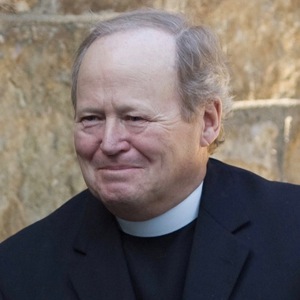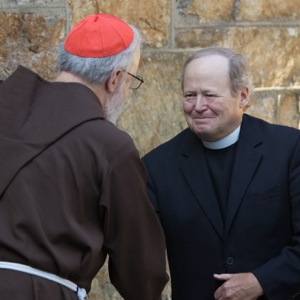
 HE RECENT passing on Christmas Day of Msgr. Michael F. Groden punctuated not only what was, but what is, and what hopefully is yet to come. Something of a “quiet lion,” his presence came roaring back as a great reminder of his contributions to the Church, the City of Boston, the liturgy, and the the responsibility we have to continue to build upon this work.
HE RECENT passing on Christmas Day of Msgr. Michael F. Groden punctuated not only what was, but what is, and what hopefully is yet to come. Something of a “quiet lion,” his presence came roaring back as a great reminder of his contributions to the Church, the City of Boston, the liturgy, and the the responsibility we have to continue to build upon this work.
Ordained in the historic year of 1965, he founded the Planning Office for Urban Affairs for the Archdiocese of Boston in 1969. He knew his mind and he knew his sense of mission. He dedicated decades of his life to developing low and affordable housing in Boston. Under his direction, the Planning Office created over twenty-six projects with over 3,000 units of affordable housing in one of the most expensive cities in the country. His life was driven to serve the Church’s mission of caring for the most vulnerable and offering them great dignity and worth. His work was a model of Lex Vivendi; how we live rises forth from our prayer and from our belief. (Lex Orandi, Lex Credendi, Lex Vivendi)
As such, Msgr. Michael Groden was not particularly well known for his liturgical or musical knowledge and interest. (Some of his liturgical malapropisms still bring a smile to our faces.) But what did being a developer, builder, and leader have to do with the sacred liturgy? Apparently, in the case of Fr. Mike Groden, quite a bit.
 N 1989 HE WAS NAMED Pastor of St. Cecilia Parish, Boston, a decrepit, dying parish in financial and physical ruins. I can attest to this as this was the same year I entered the Berklee College of Music. My dorm room was perhaps 15 meters from the church.
N 1989 HE WAS NAMED Pastor of St. Cecilia Parish, Boston, a decrepit, dying parish in financial and physical ruins. I can attest to this as this was the same year I entered the Berklee College of Music. My dorm room was perhaps 15 meters from the church.
A 19th Century building with a beautiful acoustic, the church had a partially functioning and poorly voiced pipe organ. I was hired within a year as organist. Within three years (and hardly out of the fiscal weeds) he took an enormous financial risk by to hiring me at the age of 23 as the full-time director of music. He told another priest “I have no idea how I’m going to pay for this.” He made the decision on faith—and in confidence—that the investment would pay off. Not that I needed such motivation, but knowing what trust was placed in me pushed me that much harder.
Quite curiously, the first full-time employee this developer/builder hired as pastor was a musician. A musician? Really? Yes.
Why? Good question. I’m not sure I fully have an answer. Msgr. Groden was not noted as a music lover. I don’t believe he attended many concerts. But he understood music as prayer was helping build the parish that desperately needed new life. (Significant early credit is due to my colleague and mentor, David Farwell, whom Msgr. Groden described as a “catalyst” who jump-started life into the parish in the earliest days of his tenure.) Somehow, he understood music and liturgy as the key and therefore the first steps to rebuilding a dying parish.

 IS MANAGEMENT STYLE had several critical attributes that lead to success for the music program and the parish. This most important attribute is quite rare: Even if Msgr. Groden didn’t agree with your decision or your work was not his preference, when he saw the fruit it bore, he gave you free reign to build upon your efforts and develop a successful program.
IS MANAGEMENT STYLE had several critical attributes that lead to success for the music program and the parish. This most important attribute is quite rare: Even if Msgr. Groden didn’t agree with your decision or your work was not his preference, when he saw the fruit it bore, he gave you free reign to build upon your efforts and develop a successful program.
For example, the pipe organ was not of particular interest to him. But when we desperately needed to rebuild the failing instrument, he raised funds and gave his full backing to what became the Smith & Gilbert Organ, dedicated on November 22, 1999. This organ was featured prominently at the 2014 AGO National Convention.
Furthermore, he supported the building of the Antiphonal Division in 2001, critical to enabling a 19th Century architecture to have liturgical flexibility in the 21st Century. Once we could afford it, he also supported hiring section leaders to bring our sacred music to another level. It was up to me to make sure his trust was well placed and the resources well-utilized.
Boston Pilot: • Msgr. Michael F. Groden, pastor, urban vicar, planning director
 HILE STUDYING ORGAN with James David Christie, I also became hooked on Gregorian Chant. In the 1990s we were routinely singing Gregorian Ordinaries as well as the Gregorian Communion antiphons. This was also side by side, various styles of music of the day. No one thought it was odd or unusual that we sang the true music of the Church during an era not particularly known for such sacred music. Nor do I think any of this was Msgr. Groden’s particular preference. But he knew the music program was growing and with that came his support.
HILE STUDYING ORGAN with James David Christie, I also became hooked on Gregorian Chant. In the 1990s we were routinely singing Gregorian Ordinaries as well as the Gregorian Communion antiphons. This was also side by side, various styles of music of the day. No one thought it was odd or unusual that we sang the true music of the Church during an era not particularly known for such sacred music. Nor do I think any of this was Msgr. Groden’s particular preference. But he knew the music program was growing and with that came his support.
He surrounded himself with competent, self-motivated people. He hired Mark Donohoe and Scott MacDonald, extraordinary colleagues with whom I still work today at St. Cecilia. Once you earned his trust, he had your back and you knew it. You could build upon your work and move the mission forward. This was not only a personal gift, but a pragmatic way to build a community. As a few years passed, we slowly began to realize, this dead parish was not only beginning to flower. It was beginning to thrive.
Interestingly, his liturgical attitudes could be summarized by his approach as the macro-manger he was: observing the Church’s vast history, he had no interest in the latest liturgical fads and experimentation. This was perhaps a shrewd and centered view in an age of overzealous experimentation.
But it would be a gross miscalculation to refer to him as “conservative.” A very complex man who defied labels, he was concurrently simple and straightforward by virtue of possessing enormous self-knowledge. This in turn translated into being an efficient and effective leader.
 ERTAIN LEADERSHIP skills indeed made him a powerful force for change and renewal. Perhaps I can name a few. Others who knew him well can certainly name more:
ERTAIN LEADERSHIP skills indeed made him a powerful force for change and renewal. Perhaps I can name a few. Others who knew him well can certainly name more:
• Know oneself very well—true sense of self
• Dedication to a mission/calling rather that to oneself
• Attract, employ, and support competent people—set them up to succeed
• Ability to separate one’s personal emotions and preferences for the greater good
• Not drawn into political drama or distractions (despite being surrounded by them)
• Spoke the truth despite the consequences
• Expressed genuine gratitude
Msgr. Groden’s dedication to the mission of the Church earned him great respect and loyalty. More importantly, he created an environment in which the sacred liturgy, prayer, and hence the parish could rise from the ashes and experience a renaissance. This set the stage for what was to follow. It models perhaps what is yet to come.

 S A YOUNG MUSICIAN, I was deeply fortunate to stumble upon this nurturing environment few will ever experience. Msgr. Groden was consciously or not, a patron of the arts for sacred music. He allowed me room to develop, experiment, compose, and grow. As such, the sacred music program could expand, evolve, and strive for excellence while nurturing the prayer of the community. As the years pass, this gift becomes more and more special.
S A YOUNG MUSICIAN, I was deeply fortunate to stumble upon this nurturing environment few will ever experience. Msgr. Groden was consciously or not, a patron of the arts for sacred music. He allowed me room to develop, experiment, compose, and grow. As such, the sacred music program could expand, evolve, and strive for excellence while nurturing the prayer of the community. As the years pass, this gift becomes more and more special.
As such his impact upon our lives professionally and personally is incalculable. I owe him my career, my life, and my family. For all of this I am forever grateful.
Requiscat in Pace
Soli Deo gloria

